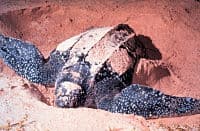 Grenada is a particularly fortunate Caribbean island in that every year the leatherback turtles visit for nesting purposes. These huge marine reptiles, that weigh up to 2000lbs shuffle up the sandy beach and then work the sand tirelessly to build a suitable nest for the 120 or so eggs that they lay. They will then compact the sand and make their way back to the shoreline, and will most likely return up to 6 times during that same season.
Grenada is a particularly fortunate Caribbean island in that every year the leatherback turtles visit for nesting purposes. These huge marine reptiles, that weigh up to 2000lbs shuffle up the sandy beach and then work the sand tirelessly to build a suitable nest for the 120 or so eggs that they lay. They will then compact the sand and make their way back to the shoreline, and will most likely return up to 6 times during that same season.
It really is an amazing spectacle to witness one of nature’s most exciting moments. The turtles are huge – up to 6 foot long and maybe 2 foot high or so. Our guests are usually quite surprised at the size and presence of these creatures and also report feeling the natural high that can come from being around nature – you know, the one that you get from the first time you see dolphins at sea.
For the turtles to visit at all is fascinating in itself. Did you know that only one out of every 1000 eggs actually make it to the point of laying their own eggs? These turtles will travel 10,000 miles or so per year in order to return to the beach that they were born on to lay their eggs. This is the reason why Ocean Spirits, the organisation who monitor and record every egg laying session, allow the baby turtles to make their own way to the shoreline upon hatching. The beach is then etched into the memory of every turtle so that they know where they need to return to.
The eggs take 50-70 days to hatch and then the tiny miniatures of these giant turtles will work hard over the sand to find the gentle waves that will take them away.
St Patrick’s Eco-Conservation Tourism Organisation (SPECTO) are responsible for taking observers along the beach to be with the turtles during egg-laying season. They will also provide a fact-filled talk on the topic of the leatherback turtles. Our guests recently attended one of these evenings and reported back that they experienced the beach landing of 6 leatherback turtles.
If you want to find out more about turtle watching at Levera Beach in Grenada, go to our Grenada turtles page.
 English
English 

Recent Comments